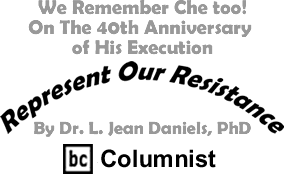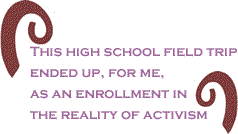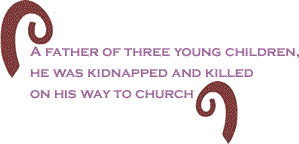
|
|||||||||||||||||||||
|
||||||||||
|
||||||||||
|
The current issue is always free to everyone If
you need the access available to a |
||||||||||
 |
||||||||||
 |
||||||||||
This is a risky venture, writing about Ernesto �Che� Guevara.� October 9, 2007, marked the 40th anniversary of his execution in Bolivia at the hands of the Bolivian Army and two US trained Cuban-American CIA agents.� I think I came to Che through my reading of Frantz Fanon in high school.� I don�t mean that Che was not part of a structured lesson on radical thinkers and activist at my high school.� But I was a newly recruited high school student in 1969 at Operation Breadbasket�s first Black Expo, held at what were then the old Chicago stockyards.� This high school field trip ended up, for me, as an enrollment in the reality of activism.� I don�t remember the entertainment that day.� At successive Black Expos I would see Aretha Franklin and Stevie Wonder.� One time, the Jackson Five would share the backstage with us, the Operation Breadbasket Choir, for about three minutes.�� But on this first day, I remember the words spoken with such conviction by activist ministers, including the young Rev. Jesse Jackson.� I was just 14 years old.� Then I had heard the names of Martin Luther King and Malcolm X occasionally from white men on CBS News, yet I never really knew who these men were and why they were always surrounded by people, people marching.� Even when I was occasionally allowed to see the unleashing of dogs and water hoses on black adults and children running for cover, I understood these incidents as events that happened to some distant people in an even more distant place called The South, far from the Southside of Chicago.�
Family members did not gather around the television to watch broadcasts showing the water hosing of black people as they did to watch brown-skinned people dance and sing.� We gathered to watch Cassius Clay, who later changed his name to Mohammed Ali, fight in the ring, but no one explained to me or even whispered among themselves about the �fighting� taking place in various rings in Georgia, in Mississippi, and in Alabama.� It was as if these were truly distant events among distant Negroes that had little if anything to do with us Negroes in Chicago.� I remember once reading a Jewish writer and asking my mother why people hated Jews.� I didn�t suspect white people hated Blacks.� My mother gave me "the look" but never answered the question.� My grandmother, a strict Catholic the rest of the week, spent her Sundays in the kitchen listening the WVON�s Gospel broadcast from morning to late at night, as if her life depended on it.� The voices of Mahalia Jackson, Rev. James Cleveland, Shirley Caeser, and Albertina Walker became recognizable even if I only half listened to the radio in the kitchen. �Every now and then, my mother would remind me that my aunt went to school with Albertina.� My grandmother�s favorite church was Fellowship Baptist Church where Rev. Clay Evans was the pastor.� Later, after I joined Operation Breadbasket, I would see Rev. Evans at many Saturday morning Breadbasket meetings, and I came to know that he was the only black pastor to embrace Rev. Martin Luther King when he came to Chicago, against the hostility of other black pastors and the political manipulation of Mayor Richard Daley, Sr.����� But my grandfather would have known about those streets of Birmingham, Selma, and those infamous popular trees in Mississippi and the associated smell of magnolia in Louisiana, his home state.� My father, too, would have known more, since he and his seven older sisters and older brother all fled the white fields of cotton and hooded men in Arkansas.� Only his older brother�s skin could not take him far enough. A father of three young children, he was kidnapped and killed on his way to church. Yet, I never heard my parents and grandparents talk about The Movement.� My father and grandfather watched balls fly from bats gripped by black hands as if the owners of these hands were gods who made everything feel victorious.� Hank Aaron, Willie Mays, Ernie Banks put smiles on their faces no matter what the final outcome of any game.� But there was a difference between my grandfather and my father; the latter could tell anyone on a good Saturday afternoon, after a few swigs of Johnny Walker Red, how he hated whitefolks.� Whitefolks, gotdammit!� He could never say more because it seemed that further words got stuck somewhere his throat.� I would wait and wait, urging him with my silence and eyes steady on him to say, say why, say something.� Whitefolks, gotdammit! �He was a man who could sit with his head down for hours, listening to Sam Cooke or the Five Blind Boys and the Mighty Clouds of Joy, and then fall asleep.�
I watched and listened and remained silent, as young ladies did in those days.� But I remembered thinking that something about this ground, right where I lived, seemed a sacred, dare I say, a battle ground, where there was something to defend, but I did not then know what .� When in the fall of 1969, at the age of 14, I unknowingly joined The Movement, although I had no idea that I was already breaking rank some, flying out of formation. I read the newspapers: The Chicago Defender and The Chicago Sun-Times, and when Cook County State�s Attorney, Edward V. Hanrahan ordered the raid on the West Monroe Black Panther Headquarters, killing Fred Hampton and Mark Clark, I was angry.� Something has happened in our community.� I recognized in the voices and behavior of the Black Panthers in the neighborhood something of James Brown and Cassius Clay.�� Hanrahan became our backyard Nixon and Hoover.� In time, I stopped �pressing� my hair and grew a large �afro.�� I pierced my ears.� I changed my name too, like the writer Haki Madhubuti. And my uncle, who had returned home after serving two terms in the Korean War with an African name because we are Black, would say, Black people from Africa! � The scheduled teacher for my home economics class was absent for a time, long enough for this beautiful black sister to come in as a sub and tell us to read a red paperback book.� It was a collection of Marx�s selected works including Das Kapital. �Something in the text spoke to me and reminded me about how I used to question (at least silently) why there were hungry and homeless people in the world after seeing the films about Africa the nuns viewed for us on Friday afternoons.� To the west, angry voices in Cicero could be heard all through Chicago as people there and in similar locations throughout the U.S. tried to protect themselves from a perceived threat to their way of life, to their values, to their families and communities.� I learned the meaning of hatred and understood how that collective hatred compelled people to resort to violent verbal and physical strategies against others.� One day, the older young people who attended the City Colleges of Chicago and the Circle Campus, as the University of Illinois was then called, came to us younger people, waving books and shouting that we must read.� We must read.� The few of us present were handed copies of Wretched of the Earth.� These policies and the system were oppressive. �You dig!� Read brother Fanon and learn!
The Movement, the struggle, was serious business.� There were movements before The Civil Rights Movement in the U.S.� There were revolutions and attempted revolutions all over the world.� The psychiatrist turned revolutionary from Martinique wrote that there are �no limits � inside the circle.�� We must close ranks with others around the world and acquire a collective consciousness of a collective history of struggle and resistance. We must read! At home, I could open a book, read a page or two, and recognize that now recognizable sound of conviction I heard at Operation Breadbasket or on Sundays, listening to Mahalia or Sam Cooke or reading Fanon�s Wretched of the Earth.� In the words of a man, an Argentinean trained medical doctor who gave up his career, I heard the shout: �I will be with the people.�� Malcolm, King, Ella Baker, and before them, Jose Marti, Sojourner Truth, Ida B. Wells, W.E.B. DuBois, and along with them Gandhi, Mandela, Lumumba sacrificed their personal careers and, in many cases, their lives, on behalf of others.� I learned that Che, too, followed a long line of committed men and women who were not afraid to think radical change in desperate times, where the many wretched of the earth suffered and died for the few who placed more value on the trinkets of the earth than people. �The time has come," Che wrote, �to settle our discrepancies and place everything at the service of our struggle.�� It is still a struggle to free ourselves from the snarling entanglement of American Empire, and we have traditions of struggle in our circle.� How will we face this new threat of repression and annihilation? This is how I met Che, along with Malcolm and King, already in the circle, already in the house we can finish building, if we go back and fetch what we have forgotten! BlackCommentator.com
Columnist Dr. Jean Daniels writes a column for The City Capital
Hues in Madison Wisconsin and is a Lecturer at |
||||||||||
| October
18,
2007 Issue 249 |
|
| Printer Friendly Version in resizeable plain text format format |
 |
 |
 |
| |
| |



































